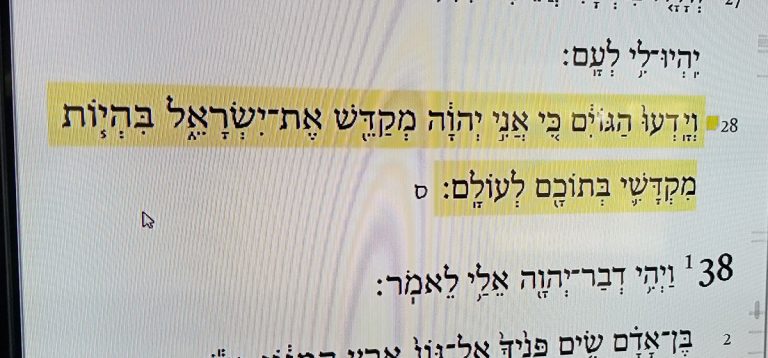Not Through the Law: Romans 4:13
One of the major elements of the new perspectives on Paul is the changing view of justification. In a broad sense, one could say that justification involves not a moment of personal salvation, but rather a moment of incorporation into a broad community, known as the people of God, kingdom of God, or the body of Christ. One of the things that Jesus did was to make it possible for you to become part of that community, and it is that community that will eventually be glorified.
The individual aspect of salvation is not eliminated, but is certainly pushed more into the background. There is less room here for the individual who has “prayed the prayer” and then never done another thing that appears related to being Christian. James might call on that person to show his or her faith by works.
Lately, I have been trying to read passages in Paul with this option in mind just to see how it fits. I am not fully convinced of the change, but I am becoming more so. Today I was again reading Romans 4:13 (it’s part of this coming Sunday’s lectionary passages), and it hit me again:
For the promise that he would inherit the world did not come to Abraham or to his descendants through the law but through the righteousness of faith. (NRSV)
Now if “law” generally refers to the Torah–and I think that’s not a bad suggestion for Romans and Galatians at least–then there’s something obvious going on here. The Torah came after Abraham. God inaugurated this whole thing without any such written body of law. Grace was the only option. Grace had to act before there was even any knowledge that things could be other than what they already were. Revelation comes to Abraham as a grace, and grace comes to him by revelation.
This reminds me of an issue I have with some Christian apologetics that attempts to prove that Jesus of Nazareth was the Messiah, the Christ, by means of tying a series of prophecies together that he fulfilled. Enough prophecies apparently should bring certainty. But how many prophecies did Abraham need? Did Moses have to fulfill a string of prophecies to prove he was anointed by God? No, each person comes through an act of God at the time. The prophecies are much more a case of tying Jesus back into the tradition stream–the community if you will–than it is a case of proving that he fits some specification.
God can come and act without getting ducks in a row. “For while we were still weak, at the right time, Christ died for the ungodly” Romans 5:6 (NRSV).


The whole point of the prophecies is Yeshua Messiah. If it was good enough for Yeshua to use it with the two on the Emmaus Road it should be good enough for us. In fact if you don’t know HIM through Torah and the Prophets, the picture of who HE is – the Torah, who’s goal (telos) purpose is Messiah, then how do you know that the one you are following is truly Messiah? Most of those alive at HIS first coming missed HIM because of their additions and subtractions from Torah and because they read the Prophets through their filters. Remember they killed the prophets because they didn’t like their message – their additions and subtractions to Torah. They were looking for a messiah that fit their oral law, their traditions that added to and subtracted from Torah and the Prophets. The professing church has done and is still doing the same thing. Why do you think Yeshua said, in Matthew 5, “Do not think that I came to destroy the Law and the Prophets!” The church not only thinks it but teaches it! What a scary place to be!!!!!
Maye I’m quibbling, Henry, but the passage you quote contrasts “law” with “the righteousness of faith.” You substitute “grace” for the latter term w/o defending the switch in terminology.
Craig:
I had to read what I wrote again, and I think I see what you’re saying, though it seems to me the problem is brevity in this case. I would suggest coming to the “righteousness of faith” is equivalent here to justification, and comes through grace. I need to write something more substantial than that, but I’ll leave that for a full post.
Banner Kid:
I’m not sure exactly what you’re getting at. At first I thought you were opposing my suggestions about the prophecies, and you probably are, but then you seem to be making another point about the church as a whole.
Let me clarify that I don’t think the only way Jesus can be tied to the Torah is through a prediction-fulfillment pairing. I believe there is a sense of fulfillment of God’s purposes, more than a point by point detail. I actually think this latter connection is stronger.
As for what you’re saying about the church, I’m not sure precisely what it is.
Craig: Let me just quote 4:16 – “The promise was made on the ground of faith in order that it might be a matter of sheer grace, and that it might be valid for all Abraham’s descendants, not only for those who hold by the law, but also for those who have Abraham’s faith. . . .” (REB)
That doesn’t cover the whole issue, but it is the connection I was using mentally at the time, reading the lection of 4:1-5, 13-17.
It’s not a big deal. But, the contrast in the passage was “law” vs. “righteousness.” I guess I was just noticing how easily we fall into more familiar terminology – like “law” vs. “grace.” The fact that Paul can use the word “righteousness” in this way suggests that there is something more “gracious” (so to speak) in the Biblical concepts of righteousness than there are in the concepts of “righteousness” today.